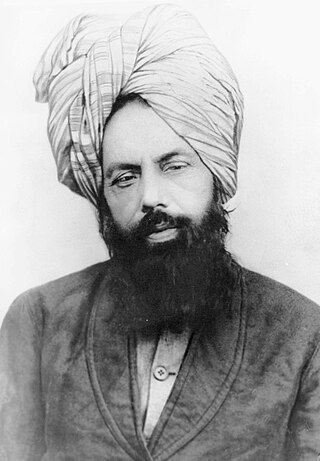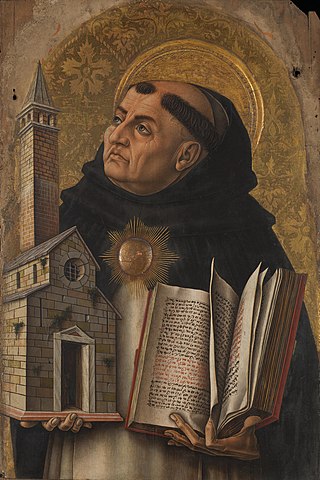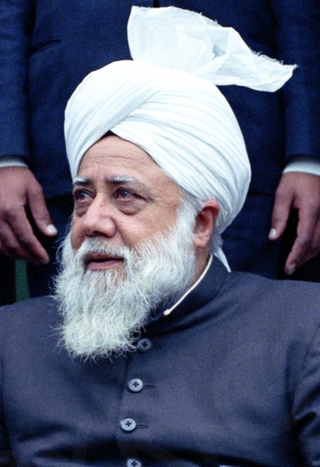
Richard Dawkins is a British evolutionary biologist and author. He is an emeritus fellow of New College, Oxford, and was Professor for Public Understanding of Science in the University of Oxford from 1995 to 2008. His 1976 book The Selfish Gene popularised the gene-centred view of evolution. Dawkins has won several academic and writing awards.
The teleological argument is an argument for the existence of God or, more generally, that complex functionality in the natural world which looks designed is evidence of an intelligent creator.

The Blind Watchmaker: Why the Evidence of Evolution Reveals a Universe without Design is a 1986 book by Richard Dawkins, in which the author presents an explanation of, and argument for, the theory of evolution by means of natural selection. He also presents arguments to refute certain criticisms made on his first book, The Selfish Gene. An unabridged audiobook edition was released in 2011, narrated by Richard Dawkins and Lalla Ward.

MirzāGhulām Aḥmad was an Indian religious leader and the founder of the Ahmadiyya Movement in Islam. He claimed to have been divinely appointed as the promised Messiah and Mahdī—which is the metaphorical second-coming of Jesus (mathīl-iʿIsā), in fulfillment of the Islamic prophecies regarding the end times, as well as the Mujaddid of the 14th Islamic century.
The existence of God is a subject of debate in theology, philosophy of religion and popular culture. A wide variety of arguments for and against the existence of God or deities can be categorized as logical, empirical, metaphysical, subjective or scientific. In philosophical terms, the question of the existence of God or deities involves the disciplines of epistemology and ontology and the theory of value.

Al-Barāhīn al-Ahmadīyyah 'alā Haqīqatu KitābAllāh al-Qur'ān wa'n-Nabūwwatu al-Muhammadīyyah is a five-part book written by Mirza Ghulam Ahmad, the founder of the Ahmadiyya Movement. The first two parts were published in 1880 CE, the third volume was published in 1882, the fourth volume in 1884 and the fifth volume in 1905. In writing the book, Ghulam Ahmad sought to rejuvenate Islam by arguing for the validity of its principles and vindicating its teachings in response to Christian and Hindu polemics against Islam as well as atheistic philosophies. In this context, a significant portion of the subject matter of the book is dedicated to the defence of Islam as a whole against the criticism of Muhammad, the Qur'an and Islam that was raised in the 18th and 19th centuries predominantly by Christian missionaries and Hindu revivalists.

The watchmaker analogy or watchmaker argument is a teleological argument which states, by way of an analogy, that a design implies a designer, especially intelligent design by an intelligent designer, i.e. a creator deity. The watchmaker analogy was given by William Paley in his 1802 book Natural Theology or Evidences of the Existence and Attributes of the Deity. The original analogy played a prominent role in natural theology and the "argument from design," where it was used to support arguments for the existence of God of the universe, in both Christianity and Deism. Prior to Paley, however, Sir Isaac Newton, René Descartes, and others from the time of the scientific revolution had each believed "that the physical laws he [each] had uncovered revealed the mechanical perfection of the workings of the universe to be akin to a watch, wherein the watchmaker is God."

Dialogues Concerning Natural Religion is a philosophical work by the Scottish philosopher David Hume, first published in 1779. Through dialogue, three philosophers named Demea, Philo, and Cleanthes debate the nature of God's existence. Whether or not these names reference specific philosophers, ancient or otherwise, remains a topic of scholarly dispute. While all three agree that a god exists, they differ sharply in opinion on God's nature or attributes and how, or if, humankind can come to knowledge of a deity.

The Quinque viæ are five logical arguments for the existence of God summarized by the 13th-century Catholic philosopher and theologian Thomas Aquinas in his book Summa Theologica. They are:
- the argument from "first mover";
- the argument from universal causation;
- the argument from contingency;
- the argument from degree;
- the argument from final cause or ends.

Dawkins' God: Genes, Memes, and the Meaning of Life is a book by Alister McGrath, a theologian who is currently Professor of Historical Theology at Oxford University. The book, published in 2004, with a second edition in 2015, aims to refute claims about religion made by another well-known professor at Oxford, Richard Dawkins. McGrath's book does not seek to demonstrate how Dawkins’ claims differ from Christianity, rather, it argues that Dawkins' arguments fall far short of the logical and evidence-based reasoning that Dawkins himself espouses.

Mirza Tahir Ahmad was the fourth caliph and the head of the worldwide Ahmadiyya Community. He was elected as the fourth successor of the founder of the community, Mirza Ghulam Ahmad. He was elected on 10 June 1982, the day after the death of his predecessor, Mirza Nasir Ahmad.
The Ultimate Boeing 747 gambit is a counter-argument to modern versions of the argument from design for the existence of God. It was introduced by Richard Dawkins in chapter 4 of his 2006 book The God Delusion, "Why there almost certainly is no God".

Hāfiz Mirza Nasir Ahmad was the third Caliph of the Messiah, head of the Ahmadiyya Community. He was elected as the third successor of Mirza Ghulam Ahmad on 8 November 1965, the day after the death of his predecessor and father, Mirza Basheer-ud-Din Mahmood Ahmad.
Since the emergence of the Big Bang theory as the dominant physical cosmological paradigm, there have been a variety of reactions by religious groups regarding its implications for religious cosmologies. Some accept the scientific evidence at face value, some seek to harmonize the Big Bang with their religious tenets, and some reject or ignore the evidence for the Big Bang theory.

In Ahmadiyya theology, the view on the Prophets of God differs significantly from Mainstream Islam. The main difference centres on the Quranic term Khatam an-Nabiyyin with reference to Muhammad which is understood by Ahmadis in terms of perfection and testification of prophethood instead of chronological finality. Accordingly, Muhammad is held to be the last prophet to deliver a religious law to humanity in the form of the Quran whose teachings embody a perfected and universal message. Although, in principle, prophets can appear within Islam but they must be non-lawbearing prophets dependent upon the sharia of Muhammad. Their prophethood is reflective of that of Muhammad, that is, within his Seal; and their role is merely that of reviving and purifying the faith. They cannot be prophets in their own right and cannot change, add to or subtract from the religious law of Islam. As such, Ahmadis, regard their founder Mirza Ghulam Ahmad (1835–1908) as a subordinate prophet who appeared as the promised Messiah and Mahdi in accordance with Islam's eschatological prophecies. In contrast to mainstream Muslims who believe Jesus to be still alive and one who would return himself towards the end of time, Ahmadis believe Jesus to have died a natural death and view the coming of such an independent, Israelite prophet to amount to breaking the Seal of Prophethood.
Gautama Buddha, the founder of Buddhism, is also venerated as a manifestation of God in Hinduism and the Baháʼí Faith. Some Hindu texts regard Buddha as an avatar of the god Vishnu, who came to Earth to delude beings away from the Vedic religion. Some Non-denominatonal and Quranist Muslims believe he was a prophet. He is also regarded as a prophet by the Ahmadiyyah.

The Ahmadiyya Movement in Islam universally accepts the process of evolution, albeit divinely guided, and actively promotes it. Over the course of several decades, the movement has issued various publications in support of the scientific concepts behind the process of evolution and frequently engages in promoting how religious scripture supports the concept.

Ahmadiyya, officially the Ahmadiyya Muslim Community or the Ahmadiyya Muslim Jama'at, is an Islamic revival or messianic movement originating in Punjab, British India, in the late 19th century. It was founded by Mirza Ghulam Ahmad (1835–1908), who claimed to have been divinely appointed as both the Promised Mahdi and Messiah expected by Muslims to appear towards the end times and bring about, by peaceful means, the final triumph of Islam; as well as to embody, in this capacity, the expected eschatological figure of other major religious traditions. Adherents of the Ahmadiyya—a term adopted expressly in reference to Muhammad's alternative name Aḥmad—are known as Ahmadi Muslims or simply Ahmadis.

The Promised Reformer Day is celebrated by Ahmadi Muslims annually on 20 February in remembrance of the prophecy concerning the birth of an "illustrious son" to Mirza Ghulam Ahmad whom the Ahmadis regard as the Promised Messiah and Mahdi, and its fulfilment in the person of Mirza Bashir-ud-Din Mahmud Ahmad, the second Caliph of the Ahmadiyya Muslim Community. It is not a celebration of Mahmud Ahmad's birth which occurred on 12 January, but rather the commemoration of the prophecy and its fulfilment in his person.
Although biological evolution has been vocally opposed by some religious groups, many other groups accept the scientific position, sometimes with additions to allow for theological considerations. The positions of such groups are described by terms including "theistic evolution", "theistic evolutionism" or "evolutionary creation". Of all the religious groups included on the chart, Buddhists are the most accepting of evolution. Theistic evolutionists believe that there is a God, that God is the creator of the material universe and all life within, and that biological evolution is a natural process within that creation. Evolution, according to this view, is simply a tool that God employed to develop human life. According to the American Scientific Affiliation, a Christian organization of scientists:
A theory of theistic evolution (TE) — also called evolutionary creation — proposes that God's method of creation was to cleverly design a universe in which everything would naturally evolve. Usually the "evolution" in "theistic evolution" means Total Evolution — astronomical evolution and geological evolution plus chemical evolution and biological evolution — but it can refer only to biological evolution.











